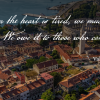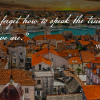
Published: October 15, 2002
View the Original Newsletter: Iskra-114.pdf
About This Issue
Iskra No. 114 reflects a season of exhaustion and reflection for Valentina Krčmar. Writing during Thanksgiving, she steps back from politics to express gratitude — for her health, her colleagues, and the enduring spirit of the Croatian community in Canada. Yet even amid this personal warmth, the issue is shadowed by global injustices and local struggles, particularly her blistering commentary on Biljana Plavšić’s plea deal at The Hague.
The issue balances outrage and optimism — anger over the hypocrisy of international justice, but also pride in the small acts of unity, faith, and heritage that keep Croatian identity alive abroad.
Editorial: “Gratitude in Hard Times”
Valentina opens the issue on Thanksgiving Day with a deeply personal letter to readers. She acknowledges the financial strain facing Hrvatska Iskra — announcing that, going forward, it will be published once a month instead of twice — but reassures readers that each issue will be richer and more meaningful.
“Only when something serious happens do we realize how much was truly right in our lives. Gratitude begins with noticing what’s already good around us.”
She expresses thanks to her contributors and supporters by name, including Biserka Milinković, Dr. Darko Desaty, Damir Borovčak, Višnja Milas-Matutinović, Marina Vuković, Vladimir Goss, and Emil Šimunović.
Valentina closes her letter with congratulations to Župa Hrvatskih Mučenika in Mississauga on its 25th anniversary, expressing her hope to celebrate the 50th together in the future.
Motrišta: “The Gift of the Guilty”
In her feature column, Valentina delivers one of her sharpest condemnations of the Hague Tribunal. Outraged by Biljana Plavšić’s plea bargain — in which the former Bosnian Serb leader admitted guilt for persecution but avoided a genocide charge — she describes the act as an insult to the victims of Bosnia and Croatia.
“A war criminal from Banja Luka now asks others to ‘re-examine their conscience’? Truly — fear the Greeks even when they bring gifts.”
Valentina recounts her memories of the Bosnian War, recalling atrocities in Bijeljina, Banja Luka, and Srebrenica, emphasizing that 250,000 people perished while the world “blinked and looked away.”
Her anger extends to the international community and the United Nations for enabling injustice through indifference:
“The Hague forgets who burned, who raped, who slaughtered. And yet it lectures us on morality. We Croats are guilty only of surviving.”
She warns that this selective justice — forgiving genocide while punishing defenders — opens the door to future conflict:
“With every unjust acquittal, we are not closing history’s wounds; we are reopening them.”
The piece concludes with her lament that Croatian generals such as Blaškić, Gotovina, and Bobetko remain imprisoned or pursued for defending their homeland, while the architects of war walk free.
National and International News
-
President Stjepan Mesić Testifies in The Hague: His four-hour testimony against Slobodan Milošević is covered in detail, reaffirming that the Yugoslav Army acted under Serbian command in its aggression against Croatia and Bosnia.
-
The Bobetko Case: The Croatian government formally disputes the Hague arrest order for General Bobetko, citing his failing health and constitutional rights.
-
UN Mission Ends on Prevlaka: The UN Security Council announces the withdrawal of its peacekeepers by December 15, 2002, returning full territorial control to Croatia. Ambassador Ivan Šimonović hails this as a milestone for national sovereignty.
Community News
The Croatian diaspora in Canada remains vibrant and engaged:
-
Farewell to Ambassador Andrija Jakovčević, who returns to Croatia after four years of service in Ottawa, thanking the community for their warmth and collaboration.
-
Opera “Nikola Šubić Zrinski” continues to draw praise following its North American premiere, with heartfelt recognition to Ivica Zdunić for his patriotic support.
-
Parish of the Croatian Martyrs in Mississauga celebrates its 25th anniversary, honoring priests and volunteers who built a strong spiritual home for Croatian families abroad.
Culture and Heritage
The issue includes a biographical feature on Oton Iveković, one of Croatia’s greatest historical painters, renowned for his depictions of national heroes and scenes from the Homeland War of the past. His art, Valentina writes, “preserved memory when words were forbidden.”
Additional pieces celebrate Croatian folklore, church architecture, and literature, including Ivana Brlić-Mažuranić’s beloved tale Šuma Striborova and an exploration of St. Mark’s Church in Zagreb, a symbol of the nation’s endurance.
Health & Wellness
Dr. Darko Desaty contributes a comprehensive article on the risks of hormone replacement therapy, summarizing new Canadian medical guidelines that weigh short-term benefits against long-term dangers.
A second piece, “About Prostate Cancer — The Illness Men Don’t Discuss,” addresses the stigma surrounding men’s health and urges regular screenings after age 45.
“Men must learn to care for themselves as carefully as they care for their cars,” writes Desaty.
Recipe of the Month
A comforting Dalmatian-style stuffed squid (punjene lignje) recipe brings warmth to the back pages — a tradition Valentina keeps alive as part of her belief that food, faith, and memory are the foundation of identity.
Gorički Bonton: “The Vineyard Code”
A humorous cultural feature lists the “rules of good behavior in the vineyards,” from not waving your hands while walking to never speaking politics at the table. Each rule, written in Kajkavian dialect, captures the wit and wisdom of old Croatian gatherings.
“Respect the host where you drink for free — and never warm yourself by someone else’s knees.”
Closing Reflection
Though filled with laughter, recipes, and gratitude, the issue ends on Valentina’s familiar note of realism. She reminds readers that truth and justice remain fragile, and that community solidarity — not the courts — will preserve Croatia’s moral strength.
“Justice denied does not erase the truth. It only makes our duty to remember even greater.”




